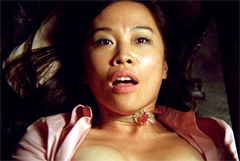
Sometimes it feels as if life is one enormous production of Waiting for Godot. ("Nothing happens, nobody comes, nobody goes, it's awful!") There is a sameness to modern existence that, fortunately, movies can disrupt for a time. Perhaps that why we love them so, and wish to live inside them.
Can a movie really change your life? Probably not. They can, however, nudge you in a different direction, offer a new perspective and sometimes even shock you into action.
The collective human experience, corralled inside a cavernous dark room, is much like Plato's cave; we watch the capering shadows, listen to the stories and are transported for a moment or two. This experience still has a tribal aspect. It reminds me oddly enough of sitting at the family dinner table as a child, listening to the grownups tell stories, and wishing they would never end. The sheer bliss of communion is increasingly hard to come by in a fractured and isolated world, but film can still unite folk, and maybe, even change the world.
With that ethos in mind, these are some of the things that have stayed with me from 2006.
Sex with tears was a common occurrence at the cinema this year; it was the opening shot across the bow in John Cameron Mitchell's Shortbus. The unsimulated aspect is guaranteed to attract a certain interest, but really, for a film that is all about sex, that is the least exciting part of the action. The mechanics are just that: nuts and bolts, positions and poses, and the people acting them out seem more sad than horny. The film follows a quartet of New Yorkers: a struggling gay couple (James and Jamie), a sex therapist who needs therapy (Sofia played by Sook-Yin Lee), and a reluctant dominatrix (Severin), who all meet at a club called Shortbus to work out their differences.
The echoes of Bob Fosse's Cabaret are explicit, which begs the question whether the current state of the U.S. and the Weimar Republic have something in common. But it is the need to escape the prison of the self that is ultimately the subtext to all that sex. Each of the characters seeks oblivion in one sense or another, if only to evade the constant scream of the ego. The ego is an insidious little critter, always hiding in the guise of righteousness, demanding to be supplicated, and liable to shatter like a Fabergé egg at the slightest blow.
Stupid ego! No wonder so much of religious or spiritual thought seems devoted to loosening its grasp from everything you do. The sense that we are all connected, and not just by our squishy bits, but by our pinkly delicate souls, as fragile as the horns of a snail, touching the air, seeking a way in the wider world, is what remains. If the film has one message to offer it's this: lose your preciousness, it means nothing, it effectively does nothing, so smash that vibrating egg (ego) to smithereens because we're all in this together, and really, whatever our differences, we're all the same.
'You're Gonna Miss Me'
Susan Sontag may have opined that art doesn't redeem Western civilization, regardless of how many Mozarts or Shakespeares we produce, but really, what else do we have? Art, music and film are still the only things that can convince me that there are noble forces still at work in the world. However, and whenever, they choose to manifest themselves, when they do, it is unmistakable: like the wind of the cosmos blowing down your spine, making all the hair on the back of your neck stand on end. If you get more than a couple of these per year, you're lucky.
One moment of true grace is exactly what You're Gonna Miss Me gives, but the rest of it is pretty interesting as well. The film meanders, following the life and times of Roky Erickson, lead singer of the 13th Floor Elevators, who was committed to an insane asylum in deepest, darkest Texas during the height of his fame. What should have been a tragedy, another lost rock and roll soul, turns into an ode to redemption, a journey into madness and partway back. This film made me care about someone I have never met and probably never will.
'An Inconvenient Truth'
Watching a great many films by myself is like dancing alone in the dark; it is very easy to slip and fall deeper inside my own head. Nowhere did this become more apparent than while watching John Cassavetes' final film, Love Streams at the Vancity Theatre, all by myself. One needs to see films with people simply to decompress afterwards, to work it out, to exorcise them. If you lack the option of doing this, a movie can ping-pong inside your brain for days on end, tugging away at you, as if your mind could worry it loose through sheer dint of effort. On the other hand, on the opening night of the DOXA Documentary Film Festival, I tricked my brother into coming with me, much to his bitter complaining, "I thought we were going to see a real movie!" he said. (But thanks to sitting next to Svend Robinson, who kept offering us popcorn, things got interesting.) Docs, in particular, are better with a friend.
By far the most interesting cinematic offerings this year happened in the realm of non-fiction, but Al Gore's An Inconvenient Truth, although not a spectacular piece of film art, must be given special acknowledgment for bringing awareness to the average person about looming environmental catastrophe. A sea change is about, and some credit must be given to Gore's global-warming road show. In Vancouver this week, you couldn't walk more than a few blocks without seeing a 100-year old tree uprooted like a beached whale. But is the deep sense of uneasiness this engenders enough to make you change your own life? Will you give up your car, your trips to Wal-Mart? Yes, it might take more than a film to do this; even a tree falling on your head doesn't appear to be sufficient.
'The Epic of Black Gold' and 'Winter Soldier'
The connection between things becomes more apparent the more films that I see; for example, war, global warming and oil seem to all tie in together in an epic panorama of human folly. I keep returning to The Epic of Black Gold, a documentary series that screened at the VIFF this fall. The series offers up an enormous slice of 20th century history that sheds light on the fury that is the Middle East.
But despite all the war documentaries released this year, a decades-old film had the most impact. Winter Soldier, made in 1972, was largely unseen until recently. This long absence has done little to lessen its force. The voices and faces of the Vietnam vets interviewed in the film give blunt testament to the tragic sameness of all wars. As it was then, as it is now, men and women barely more than children themselves sometimes, are sent to a distant place and asked to perpetrate atrocities in the name of empty ideas voiced by hollow old men. How little has changed.
'Our Daily Bread'
My uncle recently slaughtered a pig. He fed it six beers before the act, hoping it would simply pass out, drunk and blissed out as it entered the great pig beyond. Needless to say, it didn't quite work out that way. He came in the house afterwards and sat in silence for 20 minutes. When my mother told me this story, I thought immediately of Nikolaus Geyrhalter's documentary, Our Daily Bread. This near-wordless film depicts industrialized agriculture in all its mundane horror. As E. coli keeps popping up on lettuce, spinach or green onions, the repercussions of how we grow food on an epic scale are self-evident. When it comes to matters of meat, things are even more disturbing. The film's scenes of vast abattoirs have eerie echoes of Nazi gas chambers in their effective mechanization of death. The sight of naked chicken corpses still leaking blood, or cows reduced from living creatures to tidy red packages in a matter of minutes, could convince anyone that being a vegetarian is the only sane and ethical choice.
Kids' flicks
Reading all the news of global crisis (collapse of fishing stocks, killer spinach, etc.) sinks tiny fangs in my subconscious mind, but it's seeing our own kids living this reality that brings it home. I have seen more children's films than I care to admit, that convinced me, the end is nigh. A great deal of kids' films this year, as any other year, use animals as their central focus. For the most part, the storylines are identical (The Wild, Over the Hedge, Madagascar, Open Season, Barnyard, etc.) It is the very sameness of these stories that made me think something odd is going on, a form of mini-propagandizing (like mini-props) that says, "Hey, kids, the only reality is one which you can purchase, everything is for sale!" I think there is an especially hot corner of hell reserved for those people who market to children.
I watch our kids watching this stuff, and some part of me dies a little inside for the idea that children everywhere are no longer free. I asked my mother the other day when it was that everyone everywhere (or at least in North America) accepted the idea that children could no longer be left alone, or could go anywhere themselves. She thought it might have begun in part with the disappearance of Michael Dunahee. Wherever it began, it seems at some silent point in recent history, within the last twenty years, it was decided almost universally, that you must never take your eyes off your children. Even though child abductions have not drastically increased, the idea, even the slightest possibility that this might happen was enough to change everyone's behaviour. The power of fear: it works so beautifully because it plays to our deepest and most fragile places. Anyone who has a kid knows that it's like living with a gun to your head; the level of risk is so scary. But sometimes it's the creeping insidious messages, housed in happy colours and singsong stories that truly ought to be feared.
All this sounds rather hopeless, but despair, no matter how warranted, isn't really useful. Hope is a better tool. The one important thing that film can do is to shift our sense of possibility, crack open the lid of perception. This being the holiday season, a time when people settle in with their favourite films, I think it is only fitting to close with John Cassavetes talking about Frank Capra's It's a Wonderful Life: "Idealism is not sentimental. It validates a hope for the future. Capra gave me hope, and in turn I wish to extend a sense of hope to my audiences."
Amen, brothers and sisters.
Related stories:















Tyee Commenting Guidelines
Comments that violate guidelines risk being deleted, and violations may result in a temporary or permanent user ban. Maintain the spirit of good conversation to stay in the discussion.
*Please note The Tyee is not a forum for spreading misinformation about COVID-19, denying its existence or minimizing its risk to public health.
Do:
Do not: